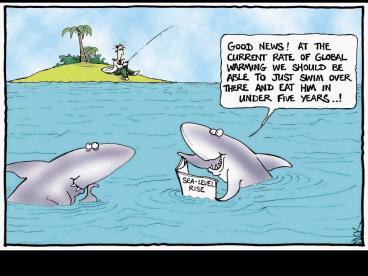Global Climate Cycles, Global Warming and Anthropogenic Greenhouse Effect - PowerPoint PPT Presentation
1 / 51
Title:
Global Climate Cycles, Global Warming and Anthropogenic Greenhouse Effect
Description:
Methane hydrate. Methane Hydrate. Immense Carbon reservoir ... Methane Hydrate. Locations where methane hydrate. has been discovered ... – PowerPoint PPT presentation
Number of Views:911
Avg rating:3.0/5.0
Title: Global Climate Cycles, Global Warming and Anthropogenic Greenhouse Effect
1
(No Transcript)
2
Global Climate Cycles,Global Warmingand
Anthropogenic Greenhouse Effect
3
Important considerations regarding global
warming and the anthropogenic greenhouse effect
- Cyclical Processes The earths environmental
conditions have been evolving through geologic
time. They tend to be cyclical over both long and
short periods of time and have changed character
greatly and abruptly. - Chaos is an operating factor
- Positive Feedback vs Negative Feedback
4
Brief History of Earth
- 4.5 b.y. ago earth formed from a cloud of dust
and gas that circled proto-sun as a disc. - Luminosity of sun was about 30 less than present
in early history, yet earth was as warm then as
now. - Atmosphere had high content of CO2
5
BBlack Dwarf
WWhite Dwarf
RRed Giant
6
- There have been multiple periods of major
continental glaciation.
7
Continental Glaciation
- Approx. Time of Glaciation Duration
- 2300 m.y. 200 m.y.
- 900 m.y. 50 m.y.
- 750 m.y. 50 m.y.
- 600 m.y 20 m.y.
- 450 m.y. 25 m.y.
- 300 m.y. 50 m.y.
- now about 10 m.y.so far
8
- Continental Glaciation in North America and
Europe began about 1.6 m.y. ago (Pleistocene or
ice ages). - Glacial and interglacial periods cycle with a
period of about 100,000 years. - Interglacial periods are about 10,000 years in
duration
9
- First modern humans appeared about 200,000 years
ago. - Peak of last glaciation occurred about 20,000
years ago. - Sea level was 400 feet lower
- Long Island was not an Island then
10
(No Transcript)
11
- Interglacial period began about 10,000 years ago.
- We are presently in an interglacial period.
- Agriculture started about 10,000 years ago.
12
- Past is key to the future
13
What will Long Island or the earth be like in
- 12 hours?
- 6 months?
- 100 years?
- 50,000 years?
- 2 b.y.?
- 5 b.y.?
- 7 b.y.?
14
What Controls Earths Surface Temperature?
15
10,000o F
60o F
0o F if no Greenhouse Effect
www.ultranet.com/jkimball/BiologyPages/
C/CarbonCycle.html
16
Real-time measurements and historical records of
climate (back to 1800s some earlier)
17
ToC
SGlobal Surface temperature
18
GGlobal Surface TemperatureScientific American,
March 2005 p. 35
19
CClimate Northern Hemisphere Moberg et al, 2005
Nature v 433, p. 613-617
20
Record from position of glaciers
21
Rhone Glacier (Present)
22
Rhone Glacier (Present)
23
Lithograph from 1850s
24
EEurope during Little Ice Age
25
(No Transcript)
26
Climate Northern Hemisphere Moberg et al, 2005
Nature v 433, p. 613-617
27
VViking settlements during Medieval Warm Period
http//emuseum.mnsu.edu/prehistory/vikings/vikhome
.html
28
(No Transcript)
29
20,000-40,000 year cycles
30
100,000 year cycles
31
(No Transcript)
32
GGreenhouse Gases
33
Anthropogenic Greenhouse Gases
- Carbon Dioxide 60
- Burning of Fossil Fuels
- Deforestation
- Methane 15
- Coal Mines
- Termites
- Wetlands (beavers)
- Rice Patties
- Cattle
- Subpolar Soil and Wetlands
- Methane hydrate
34
Methane Hydrate
- Immense Carbon reservoir
- Twice as large as all known fossil fuels
- Methane is 10 times more effective a greenhouse
gas as carbon dioxide - Occurs on sea floor at depths greater than about
2,000 feet - In polar sediments
35
Global Carbon Budget
36
Methane Hydrate
37
(No Transcript)
38
Locations where methane hydratehas been
discovered
39
- Mean global temperature has increased since
mid-1800s - Has CO2 ?
- Can we see correlations earlier? Glacier Ice.
40
(No Transcript)
41
(No Transcript)
42
(No Transcript)
43
(No Transcript)
44
(No Transcript)
45
Projected Changes in Global Climate (Short-term)
46
(No Transcript)
47
(No Transcript)
48
(No Transcript)
49
RRuddiman, 2005, Sci Am. March
50
Ruddiman, 2005, Sci Am. March
51
Ruddiman, 2005, Sci Am. March
52
Ruddiman, 2005, Sci Am. March
53
Ruddiman, 2005, Sci Am. March
54
Consequences of Greenhouse Warming
- Increase in warming
- least in tropics
- greatest toward poles.
55
Consequences of Greenhouse Warming
- Wandering weather patterns
- Increased precipitation
- Less rain in summer in U.S. midwest
- Intensity and numbers of storms will increase
- Ocean currents may be modified
56
Consequences of Greenhouse Warming
- Expansion of Oceans on heating
- Melting of glaciers
- Sea level rise of 1 to 3 feet by 2100
- More severe storms
- Result will be coastal flooding
57
Consequences of Greenhouse Warming
- Natural Habitats will be destroyed
- Forests dying
- Wild animals unable to migrate
development isolation - Areas with tropical diseases expand
58
- Agriculture may be helped or hurt depending on
area and ability of farmers to react fast enough - Water for irrigation and human use may be
inadequate for populations in drier areas
59
General Strategies
- Waiting strategy
- Compromise
- increased energy conservation
- more reliance on renewable energy
- reduce deforestation
60
The End































